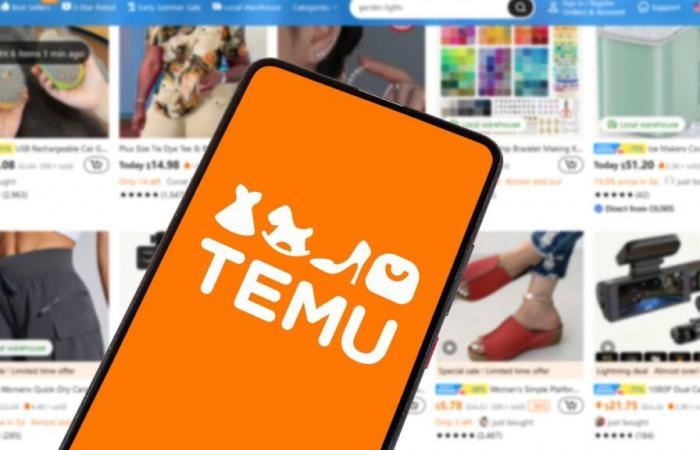Cheap, but not a bargain: Temu merchandise is often of poor quality.Image: www.imago-images.de
Deplorable quality, deception, suspected VAT fraud: within the EU, resistance against low-cost Chinese traders like Temu or Shein is growing. And in Switzerland too, politics is active. But it is not so easy to put an end to these questionable business practices.
Remo Hess, Bruxelles / ch media
A pair of men’s shoes for five francs. A smartwatch for ten francs. A blood pressure monitor for less than fifteen francs. Offers from Chinese online retailers like Temu or Shein often seem too good to be true. And indeed, the “mega-deal” often turns into a “mega-disappointment”. Instead of good deals, we end up with junk.
Consumer advocates in Switzerland and throughout Europe have been issuing warnings for a long time. It’s not just the heart rate monitor that provides erroneous results. Or the smartwatch that you can no longer turn off. Some products are simply dangerous.
Toys or clothes, same fight ????
Be careful, your device could catch fire
And the danger is not negligible. For example, some children’s cups contain toxic substances. And there is a risk of being electrocuted when using kitchen appliances. Not to mention that some radiators tend to catch fire. European safety standards are clearly often ignored.
Resistance is now being organized within the EU. No one goes as far as Raoul Rossmann, the boss of the German drugstore chain of the same name, who calls for a total ban on Temu. Supported by France and other EU countries, German Economy Minister Robert Habeck recently sounded the alarm at the European Commission in Brussels.
About Rossmann ????
He demands that the European rules in force be “rigorously applied” from now on.
“We can no longer accept that hundreds of thousands of packages arrive every day with products that do not meet European standards”
Sven Giegold, representing Robert Habeck
Concretely, Temu and Shein must face these three criticisms:
- Defective products: In addition to the glaring security flaws mentioned above, many goods arriving in Europe via major platforms do not have product certification. The “CE” label is sometimes simply falsified, Mandatory instructions for use are non-existent, as are contact details for manufacturers. All other companies, which must comply with strict European rules – which incur costs – feel cheated.
- Deception: On the Temu app, so-called special offers are sometimes accompanied by a “countdown” like “this super discount is only available for ten seconds”. Or it gives the impression that the product is about to be sold out. These are deceptions intended to encourage users to buy quickly. Such “dark patterns” are illegal.
- Tax fraud and customs evasion: in the EU, the customs exemption is 150 euros. Products not exceeding this amount can be imported free of charge. In Switzerland, the excess goes up to 62 francs. Temu plays with this rule and splits its shipments to one and the same customer in order to stay below the threshold in terms of value of the goods. Additionally, several cases have been reported where the value of goods was incorrectly indicated on packages, amounting to VAT fraud.
What is the EU planning to limit the excesses of Temu and Shein?
It is clear that the customs exemption of 150 euros will be removed. This means that even cheap Temu goods will have to be taxed. But practical implementation will pose a huge problem.
Last year, Temu sent an estimated 400,000 parcels per day to Germany alone. Across Europe, around 2 billion “duty-free parcels” arrived from China. Having them checked by customs authorities, already understaffed, is of course completely unrealistic. Europe is overwhelmed by the wave of Chinese parcels.
It would therefore be preferable to act before the packages arrive in Europe. But it’s not that simple. Indeed, the role of platforms consists solely of connecting buyers and producers.
The actual importation of the goods takes place via the European Internet user, who formally orders directly from the factory in China. From this point of view, the products land directly in private homes and are never marketed in Europe. Temu is not a trader and is therefore not responsible for the quality of “its” products.
Platforms must be held accountable
But the EU does not want to let platforms get away with it so easily. With its “Digital Markets Act” (DSA), which only came into force this year, it has options to control large online marketplaces. Illegal content, for example, including dangerous products, cannot be sold on their sites.
They are certainly not responsible for the products themselves, but they are responsible for the fact that they are sold through the platform. Fines can be heavy and amount to up to 6% of overall annual turnover. In extreme cases, a sales platform may even be banned.
At the end of June, European authorities launched the first stage of action against these Chinese platforms. The European Commission, as supervisor of the internal market, has requested formal information from Temu and Shein on their compliance with the DSA. In Brussels, this always marks the start of a criminal investigation. Last Thursday, Brussels did the same and asked new questions with a response time of ten days.
And what is Switzerland doing?
As Watson recently reported, Temu representatives were summoned to the State Secretariat for Economic Affairs (Seco) in early September to answer some questions about their business practices. These included, among other things, the use of “dark patterns” and compliance with unfair competition legislation. A complaint filed by Swiss retailers last spring was at the origin of this affair.
But politics has also recently become active. At the end of September, Green national councilor Florence Brenzikofer from Basel-Landschaft tabled a motion asking the Federal Council to impose compliance with Swiss market and security standards on foreign online traders. For this, it explicitly calls for alignment with the EU DSA law, because the Swiss authorities do not have the necessary instruments.
More articles on the Swiss population
Translated and adapted from German by Léa Krejci






